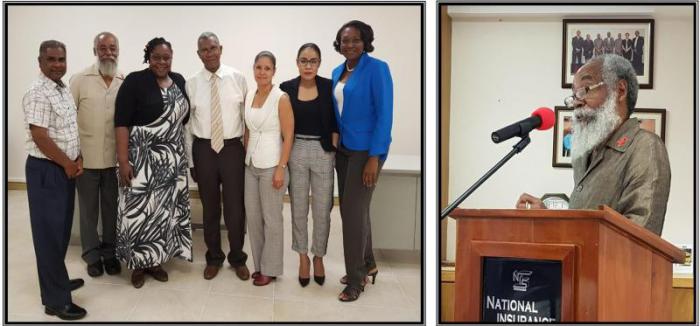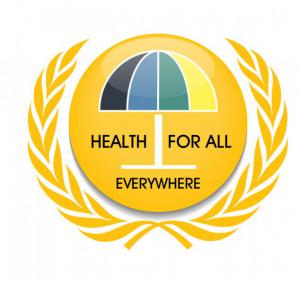Health Financing
The HEU has collaborated with national, regional and international agencies to conduct research in various areas.

Featured Research
Design and Development of a National Health Insurance Systems in Antigua and Barbuda, Grenada, St. Kitts and Nevis, British Virgin Islands

Provides guidance and technical support for the implementation of a National Health Insurance System (NHI) under universal health principles. This includes a review of the extent of the gaps in universal coverage, health financing and related impact on the functioning of the health system and entails direct engagement with key high-level staff from health, finance and national insurance to enhance local capacity to promote and manage NHI operations. Some of the key components of these projects may include:
-
An assessment of the Health Services Delivery Capabilities and Health Services Needs.
-
The design and cost of a Benefits Package.
-
Draft Legislation with accompanying business rules and procedures.
-
System Functionalities and Technical Specifications for the NHI Information System.
-
NHI Governance and Organization Design.
-
Review of Feasibility and Quantification of NHI: Revenue Generation Options.
- Guidelines for Provider Payment Mechanisms.

Regional Strategy for Universal Access to Health and Universal Health Coverage- Health Financing: Review and Recommendations
This research was funded by PAHO. The objective of this research effort was to review the health financing systems in these countries and provide preliminary recommendations, which would assist them in moving forward with the implementation of PAHO’s strategy for Universal Access to Health (UAH) and Universal Health Coverage (UHC). Reports included:
- Technical Cooperation to Caribbean Countries on Health Services and Access: Anguilla.
- Technical Cooperation to Caribbean Countries on Health Services and Access: Antigua & Barbuda.
- Technical Cooperation to Caribbean Countries on Health Services and Access: British Virgin Islands.
- Technical Cooperation to Caribbean Countries on Health Services and Access: Dominica.
- Technical Cooperation to Caribbean Countries on Health Services and Access: Grenada.
- Technical Cooperation to Caribbean Countries on Health Services and Access: St. Vincent & the Grenadines.
- Technical Cooperation to Caribbean Countries on Health Services and Access: St. Kitts & Nevis.
- Technical Cooperation to Caribbean Countries on Health Services and Access: St. Lucia.
- Technical Cooperation to Caribbean Countries on Health Services and Access: Trinidad & Tobago.
- Technical Cooperation to Caribbean Countries on Health Services and Access: Synthesized Report.


Validation of PAHO’s Monitoring and Evaluation Framework on Universal Access to Health and Universal Health Coverage in Trinidad and Tobago
This research was funded by the PAHO/WHO Technical Cooperation to Caribbean Countries on Health Services and Access. This component of the study involved the validation of PAHO’s monitoring and evaluation framework on Universal Access to Health (UAH) and Universal Health Coverage (UHC) in Trinidad and Tobago. This included preparing a health system profile of Trinidad and Tobago, which documented and analysed input availability, capacity, functioning of the health system, gaps and priority areas that needed special attention. Additionally, the progress toward universal access and coverage as well as successful experiences and lessons learned were also documented.
An Analysis of the Feasibility of Introducing a National Health Insurance (NHI) System in Montserrat
A study done for the Ministry of Health and Community Services, Government of Montserrat. This study reviewed health financing options for Montserrat, specifically, the feasibility of introducing National Health Insurance (NHI). It examined the revenue streams and the existing infrastructure and population of the country concluded that NHI was not feasible due to the small population, wage base and the dependence on aid. Collaborations with other overseas territories and CARICOM were recommended.


Economic Feasibility of National Health Insurance in the British Virgin Islands
Commissioned by the Government of the British Virgin Islands (BVI). The UWI-HEU conducted a preliminary economic feasibility of the proposed National Health Insurance (NHI) System, to aid the Government to promote the discussion on NHI with the population. Based on economic analysis of the proposed system, the Report determined the implied financial responsibility of the Government of the BVI, the contributors to the system and the cost to the country as a whole. Based on this report, the Government proceeded to implement NHI in the British Virgin Islands.
Provider Payment Mechanisms in the Caribbean
Funded by PAHO, Washington, D.C.. The project entailed a review of provider payment mechanisms in 13 Caribbean countries and provides a descriptive analysis of these systems. This research was undertaken in the context of the engagement of several countries in Health Sector Reform Initiatives, which in some cases involved changes in the way health providers were going to be paid for services. The study provided a framework for the analysis and implementation of alternative provider payment mechanisms.
The Macro Economic Implications of the National Health Insurance Plan for Jamaica
Inter-American Development Bank (IDB) / Health Reform Unit, The Ministry of Health Jamaica. This Study was commissioned to guide the development a proposed NHIP for Jamaica, by considering the non-health variables and sectors, as well as behavioural implications of consumers and providers, that impact viability and sustainability. Based on intensive data collection and analyses, well as in-depth reviews of secondary data, the Study provided an insightful discussion on the following key macroeconomic implications (i) Jamaica’s Socioeconomic Development Policies; (ii) National Output/Income; (iii) the Labour Market; (iv) the Fiscal Accounts; (v) Providers of Health Services; (vi) Consumers of Health Services and (vii) Utilization and Cost Controls. It was also instrumental in providing (i) an update of the National Health Accounts to show inflows and Outflows and (ii) areas where efficiency improvement can be made such as length of stay, procurement and distribution of supplies and maintenance practices.






